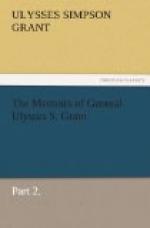I was very impatient to get to Fort Donelson because I knew the importance of the place to the enemy and supposed he would reinforce it rapidly. I felt that 15,000 men on the 8th would be more effective than 50,000 a month later. I asked Flag-officer Foote, therefore, to order his gunboats still about Cairo to proceed up the Cumberland River and not to wait for those gone to Eastport and Florence; but the others got back in time and we started on the 12th. I had moved McClernand out a few miles the night before so as to leave the road as free as possible.
Just as we were about to start the first reinforcement reached me on transports. It was a brigade composed of six full regiments commanded by Colonel Thayer, of Nebraska. As the gunboats were going around to Donelson by the Tennessee, Ohio and Cumberland rivers, I directed Thayer to turn about and go under their convoy.
I started from Fort Henry with 15,000 men, including eight batteries and part of a regiment of cavalry, and, meeting with no obstruction to detain us, the advance arrived in front of the enemy by noon. That afternoon and the next day were spent in taking up ground to make the investment as complete as possible. General Smith had been directed to leave a portion of his division behind to guard forts Henry and Heiman. He left General Lew. Wallace with 2,500 men. With the remainder of his division he occupied our left, extending to Hickman creek. McClernand was on the right and covered the roads running south and south-west from Dover. His right extended to the back-water up the ravine opening into the Cumberland south of the village. The troops were not intrenched, but the nature of the ground was such that they were just as well protected from the fire of the enemy as if rifle-pits had been thrown up. Our line was generally along the crest of ridges. The artillery was protected by being sunk in the ground. The men who were not serving the guns were perfectly covered from fire on taking position a little back from the crest. The greatest suffering was from want of shelter. It was midwinter and during the siege we had rain and snow, thawing and freezing alternately. It would not do to allow camp-fires except far down the hill out of sight of the enemy, and it would not do to allow many of the troops to remain there at the same time. In the march over from Fort Henry numbers of the men had thrown away their blankets and overcoats. There was therefore much discomfort and absolute suffering.
During the 12th and 13th, and until the arrival of Wallace and Thayer on the 14th, the National forces, composed of but 15,000 men, without intrenchments, confronted an intrenched army of 21,000, without conflict further than what was brought on by ourselves. Only one gunboat had arrived. There was a little skirmishing each day, brought on by the movement of our troops in securing commanding positions; but there was no actual fighting during this time except once,




